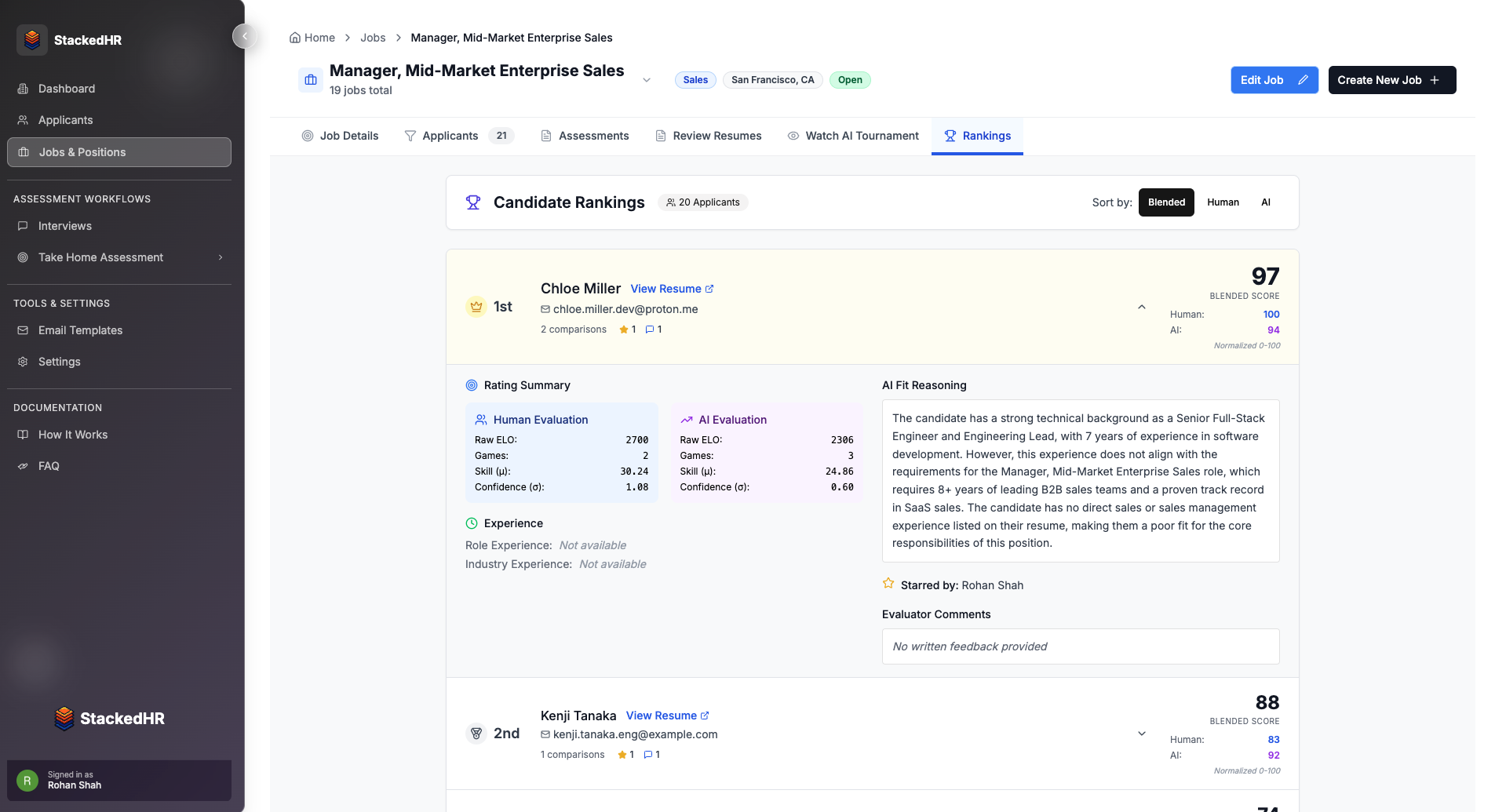The meritocracy-first hiring and evaluation platform.
While other ATS systems track applicants, we track performance. StackedHR combines your real preferences with AI evaluation to rank candidates at each stage of your hiring process.
Trusted by YC companies and enterprises alike.
No credit card required. Get onboarded and setup in 5 minutes.

Candidate Rankings
20 Applicants
Chloe Miller
chloe.miller.dev@proton.me
Kenji Tanaka
kenji.tanaka.eng@example.com
Assessment that works better when they use AI
StackedHR is the only platform that allows you to create representative work samples and rank applicants on what they would actually do on the job. Leetcode and other existing technical assessments are broken by AI, we embrace it.
Measure What Actually Matters
Skip resume screening theater. See how candidates perform on work that mirrors your actual challenges. Build assessments that predict real-world success, not interview performance.
Real-World Assessments
Create work samples that predict job success
Full-Stack E-commerce Feature
Build a shopping cart with React & Node.js
Design Challenge
Create a logo for our new product
Debug Production Issue
Identify and fix performance bottlenecks
%
More accurate performance prediction
x
Better talent discovery vs resumes
%
Reduction in hiring mistakes
Built In ATS-Lite
We're an ATS-lite with all the features you might need with none of the usual cost. Plus seamless integrations with your existing ATS if you have one.
AI Job Description Creation
Generate compelling job posts in seconds with AI that understands your requirements
Public Job Board
Automatic posting to catch applications from qualified candidates worldwide
Global Talent Pool Search
Search our database of pre-screened candidates with semantic matching
Dynamic Filters
Create job-specific filters: competitor experience, certifications, skills
Easy Resume Review
Review resumes in smart batches of 5 to create meaningful rankings
Smart Candidate Matching
AI-powered matching that goes beyond keyword searching
Find Your Use-Case
Meritocracy-first hiring.
From startups to enterprises, teams are discovering who truly performs when it matters. See how organizations like yours are building talent leaderboards based on real capabilities.
StackedHR transformed our hiring from resume roulette to performance-based decisions. We now see who actually delivers under pressure, not just who interviews well. Our talent quality has never been higher, and we're finally building the meritocracy we always wanted.
Cut Costs
We use average yearly salaries based on data from the U.S. Bureau of Labor Statistics. For a Software Engineer, the typical salary is $120,000 per year.
This is how many new people you plan to hire each month. More hires increase costs but also massively increases savings with StackedHR. The default is set to 4 hires per month for a growing agency scenario.
This is how long it usually takes to hire someone. According to SHRM, the average time-to-fill a position is 42 days. Longer hiring times increase the cost of unfilled positions. We assume a daily cost of $328.77 based on the selected position's salary for each open position.
This is how many people you usually interview before hiring one person. More candidates mean more time spent on interviews, increasing hiring costs. We assume 1 hour per candidate at $57.69/hour, plus 6 hours for job descriptions and project creation per hire. The average is set to 25 candidates based on industry data.
This is the likelihood that a hire will be unsuccessful and need to be replaced. Bad hires typically cost about 40% of annual salary in replacement costs, lost productivity, and training. Industry average is around 20%. StackedHR's evaluation system helps reduce this risk by 50%.
Your Potential Savings
Estimated savings with StackedHR:
Calculation Breakdown:
StackedHR reduces hiring time by 20% (from 42 to 34 days)
StackedHR reduces interviews by 40% (from 25 to 15 candidates)
StackedHR reduces bad hire probability by 50% (from 20% to 10%)
Monthly subscription for mid-sized agency
StackedHR optimizes your hiring process, reducing time-to-hire, interview load, and the risk of bad hires. This translates to significant savings on unfilled positions, interviewing time, and potential turnover costs.
Note: These projections are based on industry averages and the most conservative estimates of StackedHR performance data. Actual savings may vary based on your specific circumstances and implementation. The StackedHR cost is calculated at $1950 per month for a stereotypical early to mid-sized agency.
Don't settle for good enough.
StackedHR leverages research from the University of Pennsylvania and Harvard to optimize the hiring pipeline.